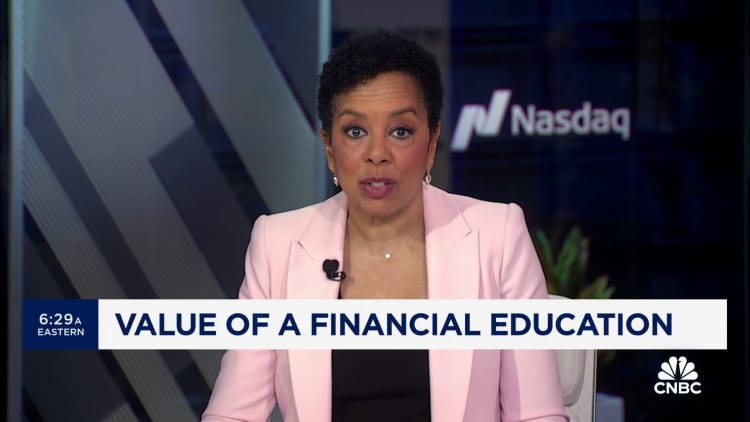Hill Street Studios | Getty Images
Thank you for reading this post, don't forget to subscribe!Keith Harris, a 17-year-old high school senior at KIPP DC College Preparatory, has studied accounting, investing and budgeting, among other basic lessons, like his English, history and math curriculum.
Harris is enrolled in his high school’s NAF Academy of Business, a rigorous three-year finance program with a work-based learning component.
Because Harris, who lives with his aunt, received a full scholarship to college next fall, he’s also able to set some of his part-time earnings aside and invest those funds.
“Through the program I developed a lot of skills, such as managing my finances and investing in stocks,” Harris said. “It laid down a good foundation for me.”
More from Personal Finance:
Number of millennial 401(k) millionaires jumps 400%
Biden ends some student loan forgiveness plans
Why the ‘great resignation’ became the ‘great stay’
Unlike other one-semester high school personal finance courses across the country, more than 160 students enrolled in the KIPP DC College Preparatory’s NAF Academy of Business program study budgeting, saving, investing and managing risk, as well as other topics, right through graduation. Some receive NAFTrack certification, a credential that demonstrates a high standard of college and career readiness.
Many students also choose to enroll in the First Generation Investors program, where they can complete capstone projects while being tutored by students from Georgetown University’s McDonough School of Business.
Additionally, internship opportunities pair students with nearby employers, including Ernst & Young, the Navy Federal Credit Union and Verizon.
The program is paid for, in part, through federal and local funding and administered by the DC Office of the State Superintendent of Education.

The goal of the program, according to Shavar Jeffries, chief executive officer of the the non-profit KIPP Foundation, is “breaking cycles of poverty.”
KIPP DC College Prep caters to an underserved population of teens, and yet 100% of the senior class are accepted into at least one college, Jeffries noted, which is largely consistent with last year’s numbers.
“Economic security has to be a key part of it,” Jeffries said. “We have too many young people who don’t have the knowledge base to make smart financial decisions. When we can add that value and students bring these lessons home, that is also very powerful.”
Donyae Vaughan, 18, a senior at KIPP DC College Prep, will graduate this spring with a number of financial classes under her belt, including Accounting 1 and 2. She also landed a summer internship at consulting firm Accenture.
“Most people my age don’t get to learn about this stuff,” she said.
Vaughan, who has plans to attend dental school, said the coursework compliments what she has been taught at home. “My family is big on saving,” she said.
“Last year we learned a lot about investments, savings and stocks and how we can grow our money,” she said. “Every time I learn something new, I would go home and talk about it with my mom.”
Vaughan said she also learned about the merit of locking in a top-yielding certificate of deposit through the program.
A trend toward in-school finance classes
“The three years is a level of robust programming we don’t typically see,” said Raven Newberry, managing director of policy at the National Endowment for Financial Education.
As of 2024, about half of all states require or are in the process of requiring high school students to take at least one financial literacy course before they graduate, according to the latest data from Next Gen Personal Finance, a nonprofit focused on providing financial education to middle and high school students.
Although some schools and school districts have required students receive some financial education even without a state mandate, it is the schools that serve students from lower socio-economic backgrounds that tend to fall short in financial education offerings, according to Newberry.
“When a state requires it, that helps close that gap,” she said.
Financial literacy leads to financial wellbeing
In addition, a 2018 report by the Brookings Institution found that teenage financial literacy is positively correlated with asset accumulation and net worth by age 25.
Among adults, those with greater financial literacy find it easier to make ends meet in a typical month, are more likely to make loan payments in full and on time and less likely to be constrained by debt or be considered financially fragile.
They are also more likely to save and plan for retirement, according to data from the TIAA Institute-GFLEC Personal Finance Index based on research collected annually since 2017.

